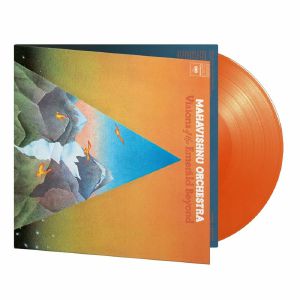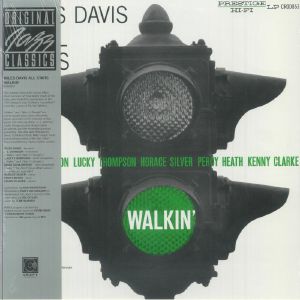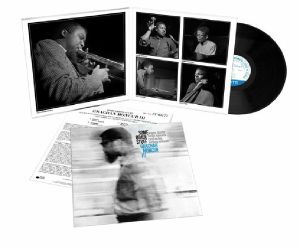Filter
Stock
Type
Music
Format
Featured
Release Title
Price
Back catalogue:
Juno's full catalogue of
Álbumes
Visions Of The Emerald Beyond (50th Anniversary Edition) (limited numbered 180 gram audiophile orange vinyl LP)
Cat: MOVLP 2205C. Rel: 29 Apr 25
Review: Mahavishnu Orchestra, a believably metaphysical force in the alternate plane that is jazz-rock fusion, released Visions Of The Emerald Beyond in 1975, indicating an accessible and funk-influenced approach compared to their earlier works. Through sprawling fusion fugues and shorter, more structured pieces, the record is, despite its compositional variety, a fadeless, seamless connected suite. 'Lila's Dance' stands tall among the movements especially, though 'Eternity's Breath' and 'Cosmic Strut' also abound in their sooling psychic projections, demoing the radical result of the shaken-up, second Mahavishnu lineup, with Mahavishnu himself, sometime Miles Davis ensemble guitarist, John McLaughlin remaining at the helm.
… Read more in stock $36.25
Walkin' (remastered) (B-STOCK) (180 gram vinyl LP with obi-strip)
Cat: CR 00853 (B-STOCK). Rel: 01 Jan 90
B-STOCK: Creasing to corner of outer sleeve but otherwise in excellent condition
Review: ***B-STOCK: Creasing to corner of outer sleeve but otherwise in excellent condition***
A striking album of the bop era that was highlighted by his undying conviction and ability to reclaim his status as a primary architect of the genre. The album is built around two exceptional groups: a sextet and a quintet, both anchored by Davis' blue-chip rhythm section of Horace Silver (piano), Percy Heath (bass) and Kenny Clarke (drums). The sextet features trombonist J.J. Johnson and tenor saxophonist Lucky Thompson, while the quintet adds Dave Schildkraut (alto sax), whose contributions, though lesser-known, are memorable. The title track, an extended 12-bar blues, shows Davis' ability to exude an air of detachment from the music, making it feel like an extension of his solo rather than the other way around. 'Blue 'n' Boogie', in contrast, is a lively, energetic tune where Davis and Johnson engage in spirited improvisation, with Johnson even quoting from Thelonious Monk's 'Rhythm-A-Ning'. 'Solar' introduces a delicate interplay, with Silver's piano solo displaying an Ellington-esque elegance. The album's final track, 'Love Me or Leave Me', foreshadows Davis' later breakthrough, with his swift and decisive trumpet solo hinting at the bold innovations to come. Walkin' stands as an essential bop-era classic, with Davis' brilliant command over his instruments and his bandmates, with pieces like 'Walkin'' and 'Solar' cementing its place as a foundational jazz work.
… Read moreA striking album of the bop era that was highlighted by his undying conviction and ability to reclaim his status as a primary architect of the genre. The album is built around two exceptional groups: a sextet and a quintet, both anchored by Davis' blue-chip rhythm section of Horace Silver (piano), Percy Heath (bass) and Kenny Clarke (drums). The sextet features trombonist J.J. Johnson and tenor saxophonist Lucky Thompson, while the quintet adds Dave Schildkraut (alto sax), whose contributions, though lesser-known, are memorable. The title track, an extended 12-bar blues, shows Davis' ability to exude an air of detachment from the music, making it feel like an extension of his solo rather than the other way around. 'Blue 'n' Boogie', in contrast, is a lively, energetic tune where Davis and Johnson engage in spirited improvisation, with Johnson even quoting from Thelonious Monk's 'Rhythm-A-Ning'. 'Solar' introduces a delicate interplay, with Silver's piano solo displaying an Ellington-esque elegance. The album's final track, 'Love Me or Leave Me', foreshadows Davis' later breakthrough, with his swift and decisive trumpet solo hinting at the bold innovations to come. Walkin' stands as an essential bop-era classic, with Davis' brilliant command over his instruments and his bandmates, with pieces like 'Walkin'' and 'Solar' cementing its place as a foundational jazz work.
in stock $35.97
Roll Call (Classic Vinyl Series) (180 gram audiophile vinyl LP)
Cat: 651497 3. Rel: 15 May 25
Review: By 1960, Georgia-born tenor saxophonist Mobley was at the height of his powers, crafting a trilogy of hard bop masterpiecesiSoul Station, Roll Call and Workout. Roll Call, the middle entry, finds Mobley leading an inspired quintet featuring the young and fiery Freddie Hubbard on trumpet, alongside the rock-solid Soul Station rhythm section of pianist Wynton Kelly, bassist Paul Chambers and the explosive Art Blakey on drums. The result is a hard bop stunner, bursting with energy, interplay and lyrical phrasing. This reissue opens with the dynamic title track, a minor-key powerhouse that jumps out of the speakers, pushing each musician to deliver their best. Mobley and Hubbard's chemistry is electrifying, their solos crackling with urgency. The swaggering 'My Groove Your Move' follows, built on a confident, swinging groove, while 'A Baptist Beat' channels the deep, soulful call-and-response tradition of the black church. A second take of the latter further showcases the group's enthusiasm and spontaneity. The album's only standard, 'The More I See You', is a sublime moment of restraint, with Hubbard's use of the harmon mute adding a delicate, smoky touch. Mobley's playing here epitomises his gift for melodic improvisationisubtle yet deeply expressive. His warm, bluesy tone and sophisticated phrasing made him one of the most lyrical saxophonists of his era. Even decades later, Roll Call remains a cornerstone of hard bop.
… Read more in stock $29.87
Some Other Stuff (Tone Poet Series) (gatefold 180 gram audiophile vinyl LP)
Cat: 554214 8. Rel: 01 May 25
Review: American triombonist Grachan Moncur III's Some Other Stuff (1964) heaved deeper into avant-garde jazz after his groundbreaking debut Evolution. Now with an all-star lineup - Wayne Shorter (sax), Herbie Hancock (piano), Cecil McBee (bass), and Tony Williams (drums) - his sophomore slay mapped a new, unsoiled territory in modal bop. The freeform opener 'Gnostic' sets an exploratory tone, while 'Thandiwa' swings a subtler tonal thurible, and 'The Twin' playfully shunts its rhythms before 'Nomadic' reintroduces them through the rise-and-fall drumming of Mr. Williams. Now reissued as part of the Blue Note Tone Poet Series, this edition delivers the record in the utmost audiophile quality.
… Read more in stock $39.29

 USD
USD









